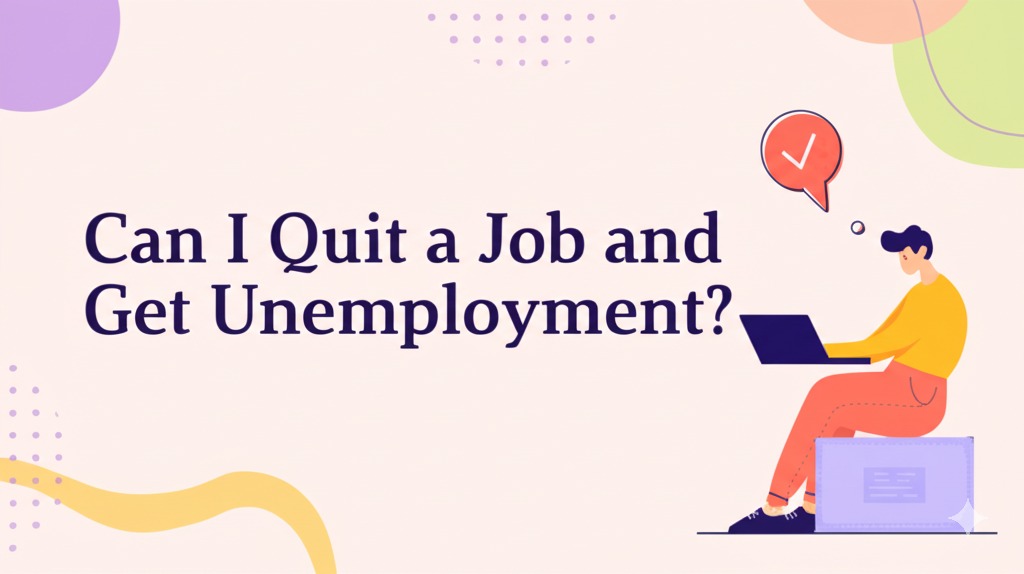
Making the decision to leave a job can be difficult, especially when financial concerns come into play. One of the most common questions employees have when considering resignation is whether they can still receive unemployment benefits. The answer is not as simple as “yes” or “no.” Several factors determine whether you qualify for unemployment benefits after quitting a job.
In this article, we’ll break down the key points you need to know about quitting a job and potentially receiving unemployment benefits, including eligibility criteria, exceptions, and important considerations.
Understanding Unemployment Benefits
Before diving into whether you can qualify for unemployment after quitting, it’s important to understand what unemployment benefits are and how they work.
What Are Unemployment Benefits?
Unemployment benefits are designed to provide temporary financial assistance to individuals who have lost their jobs through no fault of their own. Typically funded by state and federal taxes, these benefits are administered by state unemployment agencies. The eligibility for and amount of benefits can vary based on your state’s regulations.
General Eligibility Requirements
In most cases, to qualify for unemployment benefits, you must meet a few general criteria:
- You must be unemployed through no fault of your own: This means if you were laid off, furloughed, or your position was eliminated, you may qualify.
- You must be actively seeking new employment: You need to prove that you are looking for work while receiving benefits.
- You must have earned enough wages: Typically, you must have worked for a certain amount of time and earned a minimum amount of wages in your previous job.
Can I Receive Unemployment After Quitting a Job?
So, can you quit your job and still collect unemployment benefits? The short answer is that it depends on the circumstances surrounding your departure. In most states, if you voluntarily quit your job without a good cause, you will not be eligible for unemployment benefits. However, there are exceptions.
Voluntary Resignation vs. Termination
When it comes to unemployment benefits, the key factor is whether you voluntarily resigned or were terminated:
- Voluntary resignation: If you decide to quit your job, you are generally not eligible for unemployment unless you had a valid reason.
- Termination: If you are fired, you may still be eligible for benefits, depending on the circumstances and the reason for your termination.
Valid Reasons for Quitting a Job and Receiving Unemployment
Although quitting a job typically disqualifies you from unemployment benefits, there are specific situations where you may still be eligible. These valid reasons usually involve serious issues at the workplace that make it impossible or unreasonable for you to continue working.
Common Valid Reasons Include:
- Health problems: If you had to quit due to medical issues that prevented you from doing your job, you may be eligible. This might include physical health issues or mental health challenges, but you may need to provide medical documentation.
- Unsafe working conditions: If your workplace is unsafe or violates safety regulations, and you’ve reported it to management without resolution, you may be able to claim unemployment benefits.
- Harassment or discrimination: If you were subjected to workplace harassment, discrimination, or a hostile work environment, and you had no choice but to resign, you may be eligible for unemployment.
- Significant changes to job duties or hours: If your employer significantly changed your job responsibilities, pay, or work schedule without your consent, and you were forced to quit, you could qualify for unemployment.
Proof of Good Cause
To successfully claim unemployment benefits after quitting, you will likely need to provide evidence supporting your decision to leave. This might include medical records, witness statements, or other documentation.
How to Apply for Unemployment Benefits
If you have decided to quit your job and believe you may be eligible for unemployment benefits, follow these steps to apply:
- Contact your state’s unemployment office: Each state has its own system for applying for unemployment benefits. Start by visiting your state’s unemployment website and reviewing the application process.
- Provide required information: You’ll need to submit details about your previous employer, your reason for quitting, and any supporting documentation.
- Wait for the determination: After your application is submitted, the unemployment office will review your case and make a determination. Be prepared to provide additional documentation if requested.
- Appeal if necessary: If your claim is denied, you have the right to appeal the decision. This process varies by state but generally involves providing additional evidence to support your claim.
Potential Consequences of Quitting Without Good Cause
While it’s important to understand your rights and the potential benefits, it’s also crucial to be aware of the consequences of quitting a job without a valid reason.
- Denial of benefits: In most cases, you will be denied unemployment benefits if you voluntarily quit your job without a good cause.
- Long wait for benefits: Even if you do qualify, the process can be lengthy, and benefits may take weeks to begin.
- Reputation with future employers: Quitting without a valid reason could affect how future employers view your commitment to your previous role, which could impact your job search.
Conclusion: Should You Quit Your Job?
The decision to quit a job is never an easy one. If you are considering leaving your current employment and are wondering about unemployment benefits, remember that quitting without good cause typically disqualifies you. However, if you have a valid reason—such as unsafe working conditions, health issues, or harassment—you may still be eligible.
Before making any decisions, make sure to check your state’s unemployment guidelines and gather any necessary evidence. If you’re uncertain about your situation, it may be worth consulting with an attorney or an unemployment office representative to ensure that you understand your rights and options.

Andre Cuevas provides career insights, job search strategies, and professional advice to help individuals navigate the job market and achieve their career goals.





